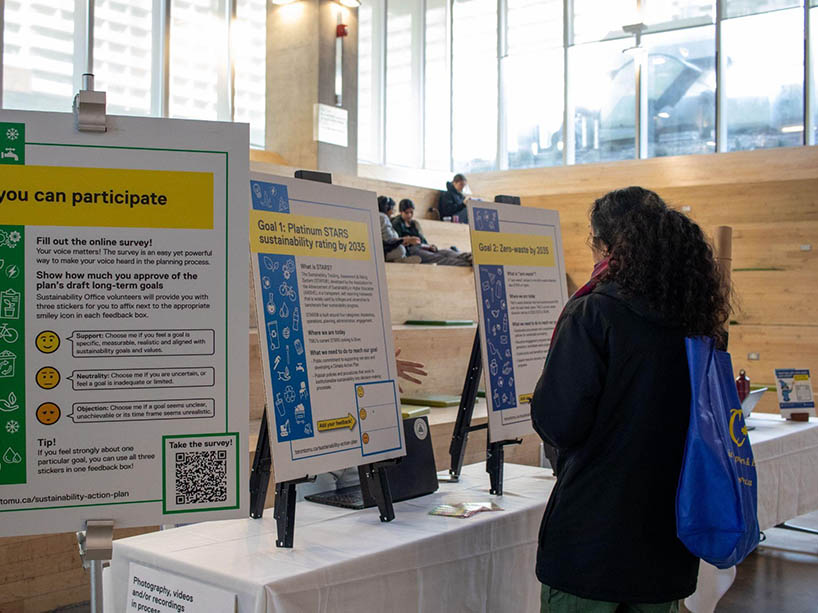TMU’s sustainability initiatives earn Gold rating

A community member reviews the Sustainability Action Plan goals at a community consultation. The plan lays out realistic, inclusive and reflective goals that align with the TMU community’s needs and values.
From diverting clothing and office furniture from landfills to incorporating sustainability into decision-making processes across university departments, Toronto Metropolitan University (TMU) has made extraordinary strides to improve sustainability on campus. As a result, TMU has recently earned a Gold rating from the Sustainability Tracking, Assessment & Rating System (STARS) (external link) .
Developed by the Association for the Advancement of Sustainability in Higher Education (AASHE), STARS is a transparent, self-reporting framework that is widely used by colleges and universities to measure and benchmark sustainability performance. The framework assesses institutions on four categories: academics, engagement, operations and planning and administration. TMU excelled in multiple categories including coordination and planning, campus engagement and academic research.
The university’s Gold STARS rating is a reflection of the significant progress made by TMU. The university submitted its first STARS report in 2020, earning a Silver rating.
“This recognition as a Gold STARS institution is a testament to the collective effort of our entire university to develop and implement these programs, and underscores that sustainability is a core value at TMU,” said Saeed Zolfaghari, vice-president, administration and operations at TMU. “Our faculty, staff and students have shown great dedication to growing sustainability across TMU and making a real difference for our campus and our surrounding community.”
Sustainability Action Plan
The university’s Sustainability Action Plan, released on Earth Day earlier this year, is a considerable accomplishment and a point of distinction in TMU’s STARS rating.
The action plan lays out clear goals for systematically tackling urgent sustainability issues and provides a roadmap for achieving those goals through incremental changes in operations, physical systems, culture and behaviour. TMU’s long-term goals include achieving a Platinum STARS rating by 2035, becoming a zero-waste campus by 2035 and reducing Scope 1 and 2 greenhouse gas emissions to net-zero by 2045.
The action plan integrates best practices from the STARS framework, underscores TMU’s commitment to excelling in sustainability and contributes to the United Nations Sustainable Development Goals (SDGs) for ending poverty, protecting the planet and tackling inequalities.
"Sustainability demands an interconnected lens. It's not just about making our buildings energy-efficient; it's also about considering the health, safety, and well-being of the people who use them. All of these elements must advance together, and the STARS framework helps us take this holistic approach,” said Sharmilla Raj, sustainability manager at TMU.
In 2023, TMU established the Climate Change and Sustainability Advisory Committee (CCSAC) to support the development of the Sustainability Action Plan and to ensure the plan’s targets were realistic, inclusive and reflective of the TMU community’s needs and values. The committee, consisting of 21 members representing students, faculty and staff, provides a platform for the university community to contribute to climate action and sustainability efforts. It also ensures sustainability principles and practices are incorporated into decision-making processes at all levels of the institution.
Reduce, reuse, research
One initiative aimed at reducing TMU’s environmental impact is the Sustainable Purchasing Guidelines. The guidelines ensure purchases align with the university’s goals for responsible resource management and social sustainability. They focus on five key principles: eliminating unnecessary purchases, prioritizing circularity, assessing total life cycle cost, choosing eco-friendly-certified products and exploring sustainable and diverse suppliers.
Two other initiatives working to reduce waste and create a circular economy on campus are the TMU Free Store and the Furniture Rehome Program. The TMU Free Store is a pop-up store that collects and redistributes donated kitchen and office supplies, home decor, electronics and more to students. Since the first pop-up in 2022, the program has rehomed more than 5,635 items with an estimated value of more than $50,000. The Furniture Rehome Program repurposes office furniture and supplies on campus, giving them new life at new department offices.
TMU’s commitment to improving sustainability and creating a healthy and equitable environment also includes research, an area where the university excels. TMU received a perfect score in the STARS research category, reflecting the university’s depth of sustainability-focused research.
As a Living Lab, the Urban Farm facilitates interdisciplinary research, bringing together urban farmers, community partners and academics. Other sustainability-focused research groups include Urban Water Research Centre, Centre for Urban Energy, Centre for Studies in Food Security and City Building TMU. TMU faculty and student research span numerous industries such as sustainable architecture, active transportation, environmental health, sustainable fashion and environmental law and policy.
Next steps
TMU improved its STARS rating from Silver to Gold in just four years and the Sustainability Office is now looking towards achieving Platinum, the STARS framework’s highest rating.
“While reaching this milestone is a significant achievement, we recognize that there is still a long journey ahead,” said Raj. The collective effort from students, faculty and staff to achieve our other two long-term objectives, net-zero and zero waste, will support our continued advancement in sustainability and help us achieve Platinum.”
Related stories:
